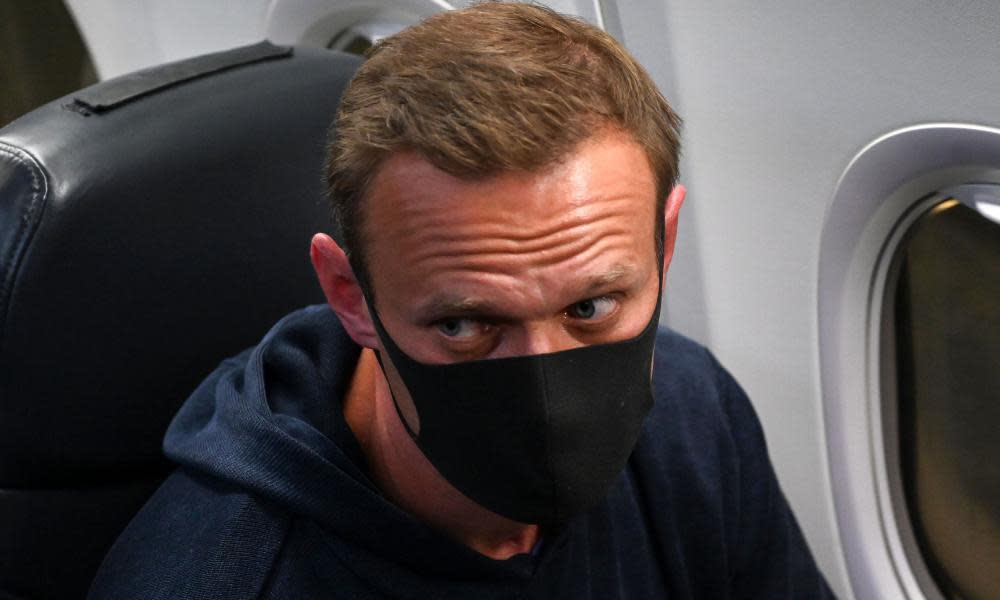Alexei Navalny arrives in Moscow after recovery from poisoning

The Russian opposition politician Alexei Navalny has arrived in Moscow nearly five months after a suspected poisoning by Russia’s FSB spy agency left him fighting for his life.
Navalny’s plane landed at Moscow’s Sheremetyevo airport on Sunday evening after being diverted from Vnukovo airport where supporters and media had been waiting.
Speaking onboard a plane in Berlin shortly before takeoff, Navalny said he did not expect to be arrested when he arrived in Moscow. “I am not afraid,” he said, joking instead about the freezing temperatures that awaited him in the Russian capital.
Related: Poison squad stalked Alexei Navalny on 40 flights, says Bellingcat investigator
Navalny said he was “extremely happy” to be going home. “I have every right to go back,” he said. “I don’t expect anything to happen. Nothing will occur.”
Navalny and his wife, Yulia, had to wade through a crowd of dozens of journalists who were travelling to Moscow with him.
After thanking airline staff in English, he took a window seat in row 13. He was evidently in good spirits. “What bad things can happen to me inside Russia,” he quipped, then telling reporters: “We won’t be able to take off unless you sit down.”
Navalny’s return is a direct challenge to Vladimir Putin and the Kremlin, which has sought to keep the opposition leader in exile by indirectly threatening him with prosecution and jail time if he comes back.
Navalny had been expected to land at Moscow’s Vnukovo airport at 4.20pm GMT on the flight from Berlin, where he has been recuperating from the poisoning attack since August. But moments before the plane was due to land it was diverted to Moscow’s Sheremetyevo airport, keeping Navalny well away from a band of supporters who had gathered to greet him as well as waiting media.
The plane being diverted did not stop police from clearing Vnukovo airport of his supporters.
Riot police in helmets are now clearing the airport of Navalny supporters and media. Just forty minutes til Navalny is scheduled to land. pic.twitter.com/tErKEUnTNc
— Andrew Roth (@Andrew__Roth) January 17, 2021
Despite Navalny’s optimistic comments before departure, it appears likely he will be taken into custody on arrival. Moscow’s prison service says it has orders to detain him for parole violations that could lead to up to three and a half years in prison, and the investigative committee says it is investigating him for alleged fraud in a separate case that could carry a decade-long sentence.
“The question of returning or not was never before me,” Navalny wrote in an online post earlier this week, calling on supporters to “meet me” at the airport. Russian police have said they have begun detaining his supporters travelling to Moscow for planning to hold an “illegal” rally. The airport has said that it cannot host mass events due to the coronavirus epidemic.
Interest in his case inside Russia remains high. The independent channel TV Rain livestreamed his departure from onboard the plane. Navalny decided to fly home with the carrier Pobeda, which means victory.
The Kremlin is likely to seek retaliation for a Bellingcat investigation that traced the movements of an FSB hit team that shadowed Navalny around Russia for years. Navalny himself elicited a confession by telephone from one of the men who took part in the operation.
The revelations were deeply embarrassing for the Kremlin. Putin called the report a “falsification” and accused Navalny of being backed by western intelligence agencies. Investigators have also refused to open a criminal case about Navalny’s poisoning, saying they had “[no] concrete evidence about circumstances indicating the signs of criminal activity by members of Russia’s FSB”.
Doctors at Berlin’s Charité hospital have described the poison used against Navalny as one of the novichok series, similar to the one used in the 2018 attack in Salisbury.
On the eve of his journey, Navalny wrote posts thanking Germans for their hospitality and promising supporters that he would indeed be flying into Moscow on Sunday.
In an Instagram post, he said his five months in Germany had shown him “the cliches about Germans are not true”. He called them “nice, helpful, friendly people ... the nicest people with a great sense of humour who always try to help”. One of the highlights of his stay, he said, had been meeting the German chancellor, Angela Merkel, who visited him in hospital.
The tabloid Bild called it a “charming farewell message”. It said it feared he was “risking his life” by returning to Russia.
His and his wife’s passports were reportedly sealed in a secure box that was delivered to the airport under police guard.

 Yahoo Movies
Yahoo Movies 
